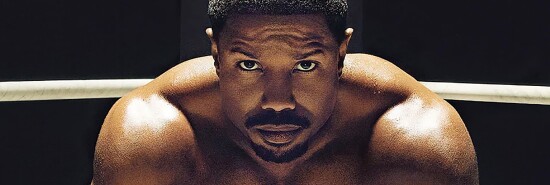
Creed III punches above its weight
Chris Vognar
The past is a main character in all of the Creed movies (and most of the Rocky movies as well). It’s always out there lurking, reminding a young man of his family legacy or an older man of the places he’s been, good and bad, by choice or not. In Creed III, personal history takes on a formidable physical presence in one Damian Anderson (Jonathan Majors, who looks like he’s been bench-pressing bulldozers), an angry ghost from a chapter in Adonis’s life he’s been trying to outrun for years. Adonis and Damian were friends and allies in the group home where they spent a chunk of their childhoods. Then Damian, a Golden Gloves champion, took the fall for a crime that Adonis precipitated, and he went away for 18 years while Adonis became the hero of his own movie franchise. Now Damian is out. And he’s hungry.
These movies hinge on how well they pull off their maximum-drama premises; nobody goes to see them for delicate nuance. And yet, in its own rough way, that’s exactly what Creed III delivers, even when it wades through bombast and cliche. This is a movie about the fine line between the street and the ring (or the court or the field), between a jail cell and a mansion, and how a fleeting moment can determine which side you end up on. It also reinforces a theme that’s been running through these films at least since Sylvester Stallone’s Rocky tried to retire and become a TV pitchman in 1979’s Rocky II: Fighters gotta fight. It’s in their blood. It gives them purpose. It gets them high. And they will accept no substitute in civilian life.
As Creed III opens, Adonis (Michael B. Jordan, also making his directorial debut) is finishing off old opponent “Pretty” Ricky Conlan (Tony Bellew) to become the undisputed heavyweight champ. Time to sail off into the sunset, enjoy the good life with his wife, Bianca (Tessa Thompson), and their lovely little daughter, Amara (Mila Davis-Kent). Build a boxing business empire with his manager and trainer, Duke (Wood Harris). Wear designer sweatsuits and count his money.
But you can see the restlessness in his eyes, even before his past comes calling.
Enter Damian, sauntering back into Adonis’s life like the once-gone-but-never-forgotten femme fatale of a classic film noir. Damian has been in the pen, and Majors, an uncommonly sensitive actor, conveys a tricky combination of displacement, open-eyed wonder, and ravenous, barely concealed rage as he pays a visit to his old friend. They enjoy a meal. They reminisce. But Damian, as they say, is not entirely what he seems. He has his own dreams, schemes, and towering resentments. And if you don’t think they’ll draw Adonis back into the ring, you’ve never seen one of these movies (or the trailer).
Adonis, like one of those noir heroes, doesn’t want to think or talk about the past, a reluctance summed up neatly in a brief exchange when Damian has dinner at the Creeds’ palatial home. “You remember them bed bugs?” asks Damian as Bianca learns for the first time that her wealthy, successful husband lived in a group home. “I try to forget them,” Adonis replies.
But for Damian, as Faulkner once said, the past isn’t dead. It’s not even past. The screenplay, by Keenan Coogler (brother of original Creed director and Creed III producer Ryan Coogler) and Zach Baylin, has a knack for saying a lot with a little, thanks largely to an innate grasp of character. Jordan was fortunate to have a great script for his bow as a director, and he makes the most of it as he works well with big scenes and small ones. This won’t be his only trip behind the camera.
He proves adept in the ring as well, though here I have quibbles. Damian gets his first big break when he (illegally) engineers a title shot against the rising star of the burgeoning Creed Management, Felix Chavez (Jose Benavidez). But when they step into the ring, Chavez looks like a welterweight going up against a heavyweight, a surefire slaughter. In real life, Benavidez fights professionally as a welterweight. These things may seem small. The filmmakers clearly liked something about Benavidez for the role, and these movies were never all about verisimilitude. But in a movie that obviously cares about its boxing, details count.
Meanwhile, 9-year-old Davis-Kent all but steals the show and facilitates the movie’s richest gambit. She’s a deaf actress playing a deaf character — Bianca’s hearing loss has been a subplot through the first two films — and Creed III makes a firm and inspired commitment to using American Sign Language with subtitles in all of her scenes. Amara wants to be a fighter like her dad; she disposes of a bully at school with a quick right cross, and Adonis, though he must appear to disapprove, is a proud papa. In making Amara, and Kent-Davis, a central part of Creed III, the filmmakers make a simple but brave move of inclusion that also fits right into the story.
Creed III, like its two predecessors, is better than a franchise movie needs to be. It would have made money just by showing up to the fight based on name recognition alone. That name, however, has come to stand for quality, and the deeper the franchise gets, the harder it hits.
Chris Vognar is a culture writer living in Houston.
